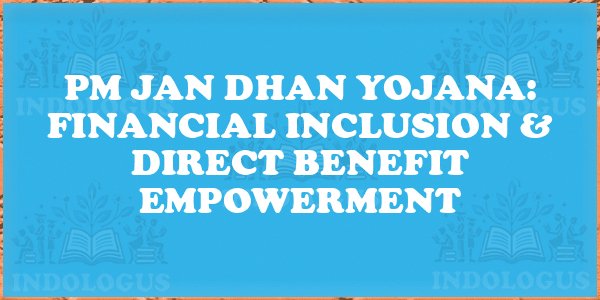The Pradhan Mantri Jan Dhan Yojana (PMJDY), launched in 2014, has revolutionized financial inclusion in India, covering almost all households and empowering 90% of adults through direct benefit transfers and banking services.
Financial Inclusion Revolution
From Exclusion to Inclusion
- Nearly 100% of households and over 90% of adults are now banked.
- 56.2 crore PMJDY accounts opened, a four-fold increase since March 2015.
- 37.5 crore accounts in rural areas and 18.7 crore in urban regions.
Gender Empowerment and Digital Reach
- 56% of PMJDY accounts are held by women, enhancing their financial independence.
- Increased participation in government schemes and self-help groups.
RuPay Cards and Digital Usage
- Over 38.7 crore RuPay cards issued, promoting digital payments.
- PMJDY accounts used for savings, micro-insurance, and investments.
Direct Benefit Transfer: No More Middlemen
- Welfare payments directly credited into bank accounts, reducing delays and corruption.
- Transparent system for easier monitoring, crucial during crises like demonetization and Covid-19.
Infrastructure Growth and Banking Access
Doorstep Banking Services
- 16.2 lakh bank mitras deployed for remote areas.
- Banking outlets within 5km of 99.9% of inhabited villages.
Integration with Social Security Schemes
- PMJDY enables easy enrolment in Jan Suraksha schemes like PMJJBY and PMSBY.
- Enhanced social safety net, particularly for the unorganised sector.
Global Recognition and National Impact
- World Bank’s Findex 2024 report: 89% account ownership among individuals aged 15+ in India.
- NSS 2022-23 survey: Account ownership even higher at 94.65%.
- Total balance in PMJDY accounts: Rs 2.68 lakh crore, a 17-fold increase since 2015.
Key Takeaways for Competitive Exams
- PMJDY launched in 2014 for universal banking access.
- Financially empowered nearly all households in India.
- Significant gender inclusion with 56% accounts held by women.
- Direct benefit transfers reduce delays and corruption.
- Wide banking outreach in remote areas with doorstep services.
- Integration with social security schemes for enhanced financial security.




